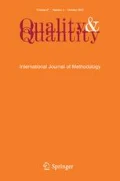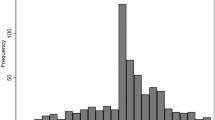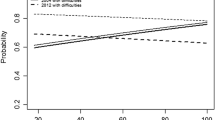Abstract
Research on social capital in general and trust in particular is markedly increased. The worldwide problem of low and decreasing levels of trust in many public institutions is greatly debated. This is a very important problem because the trust citizens have in public institutions may foster democratic practices and facilitate better provision of public services. Moreover, trust is a central element of social order and survival of any democratic regime: it affects institutional performance, wellbeing, economic development and crime reduction. Public institutions should pay very much attention to citizens’ trust in them and in particular when introducing reforms aiming at improving their functioning. Trust is difficult to be assessed due to its quite elusive meaning. An index of general trust in public institutions is proposed within the framework of composite indicators. It is shown how to reduce the dimension of the index by finding out the most and least important aspects of it. Uncertainty analysis is used to test whether dimension reduction results are robust or not with respect to plausible changes in variable values and variable transformations. An application to data from the European Social Survey is discussed. The results show the very important role of the trust in politicians and political parties in explaining the level of general trust in public institutions.
Similar content being viewed by others
References
Arvid Bäckström, A., Edlund, J.: Understanding the Link Between Trust in Public Institutions and Welfare Policy Preferences, Working Paper, vol. 4. Department of Sociology, Umeå Universitet, Sweden (2012)
Askvik, S., Jamil, I., Dhakal, T.N.: Citizens’ trust in public and political institutions in Nepal. Int. Political Sci. Rev. 32, 417–437 (2011)
Bandura, R.: A Survey of Composite Indices Measuring Country Performance: 2006 Update. United Nations Development Programme, Office of Development Studies, New York (2006)
Bouckaert, G., Van de Walle, S., Kampen, J.K.: Potential for comparative public opinion research in public administration. Int. Rev. Adm. Sci. 71, 229–240 (2005)
Cox, D.R., Fitzpatrick, R., Fletcher, A.E., Gore, S.M., Spiegelhalter, D.J., Jones, D.R.: Quality-of-life assessment: can we keep it simple (with discussion)? J. R. Stat. Soc. Ser. A 155, 353–393 (1992)
ESS: ESS-5 2010 Documentation Report Edition 2.0. European Social Survey Data Archive, Norwegian Social Science Data Services (2012)
Fayers, P.M., Hand, D.J.: Causal variables, composite indicators and measurement scales: an example from quality of life. J. R. Stat. Soc. Ser. A 165, 233–261 (2002)
Gleave, E., Robbins, B., Kolko, B.: Trust in Uzbekistan. Int. Political Sci. Rev. 33, 209–229 (2012)
Herreros, F., Criado, H.: The state and the development of social trust. Int. Political Sci. Rev. 29, 53–71 (2008)
Horne, C.M.: Assessing the impact of lustration on trust in public institutions and national government in Central and Eastern Europe. Comp. Political Stud. 45, 412–446 (2012)
JRC: State of the Art Report on Current Methodologies and Practices for Composite Indicator Development. Joint Research Centre, European Commission, Ispra (2002)
Kääriäinen, J.T.: Trust in the police in 16 European countries: a multilevel analysis. Eur. J. Criminol. 4, 409–435 (2007)
Marozzi, M.: A composite indicator dimension reduction procedure with application to university student satisfaction. Stat. Neerl. 63, 258–268 (2009)
Marozzi, M.: Composite indicators: a sectorial perspective. In: Perna, C., Sibillo, M. (eds.) Mathematical and Statistical Methods for Actuarial Sciences and Finance, pp. 287–294. Springer, Milano (2012)
Marozzi, M.: Tertiary student satisfaction with socialization: a statistical assessment. Qual. Quant. 46, 1271–1278 (2012)
OECD: Handbook on Constructing Composite Indicators. OECD, Paris (2008)
OECD: Citizens as Partners: OECD Handbook of Information, Consultation and Public Participation in Policy Making. OECD, Paris (2011)
Rolef, S.H.: Public trust in parliament: a comparative study. The Knesset Information Division, Jerusalem (2006)
Saisana, M., Saltelli, A., Tarantola, S.: Uncertainty and sensitivity analysis techniques as tools for the quality assessment of composite indicators. J. R. Stat. Soc. Ser. A 168, 307–323 (2005)
Shlapentokh, V.: Trust in public institutions in Russia: the lowest in the world. Communist Post-Communist Stud. 39, 153–174 (2006)
Stevenson, B., Wolfers, J.: Trust in Public Institutions over the Business Cycle, Working Paper, vol. 11. Federal Reserve Bank of San Francisco, San Francisco (2011)
Tan, S.J., Tambyah, S.K.: Generalized trust and trust in institutions in Confucian Asia. Soc. Indic. Res. 103, 357–377 (2011)
Wallace, C., Latcheva, R.: Economic transformation outside the law: corruption, trust in public institutions and the informal economy in transition countries of Central and Eastern Europe. Eur. Asia Stud. 58, 81–102 (2006)
Author information
Authors and Affiliations
Corresponding author
Rights and permissions
About this article
Cite this article
Marozzi, M. Construction, dimension reduction and uncertainty analysis of an index of trust in public institutions. Qual Quant 48, 939–953 (2014). https://doi.org/10.1007/s11135-012-9815-z
Published:
Issue Date:
DOI: https://doi.org/10.1007/s11135-012-9815-z
Keywords
- Composite indicator
- Monte Carlo methods
- Dimension reduction
- Uncertainty analysis
- Trust in public institutions




